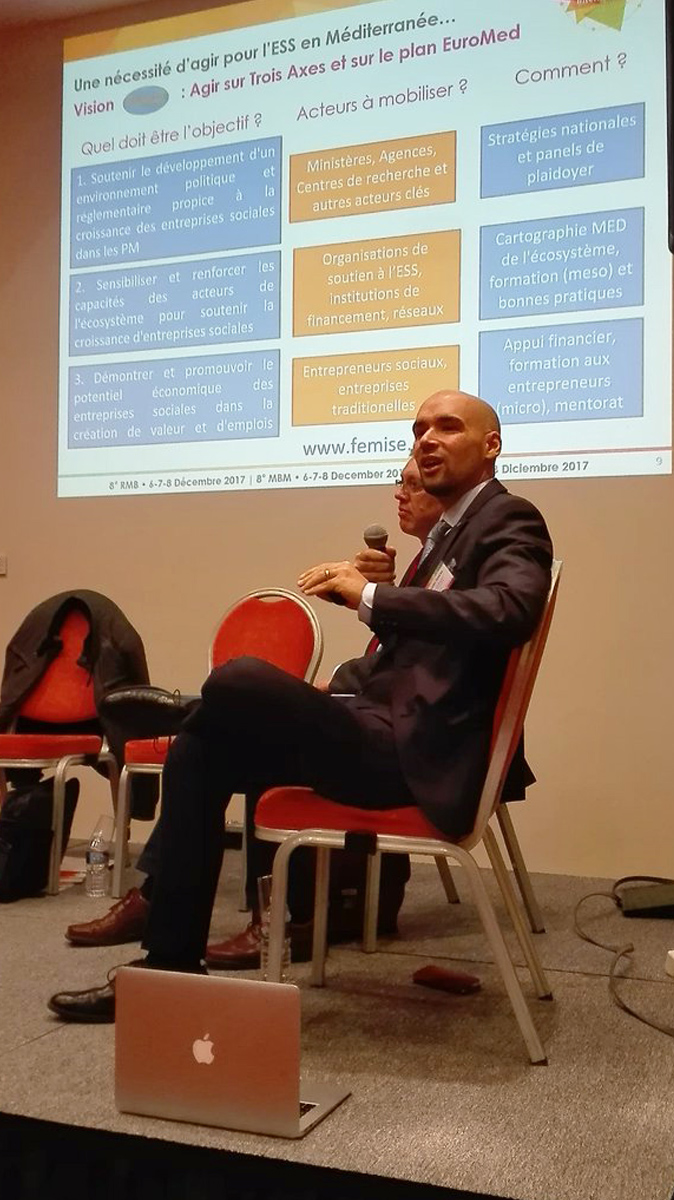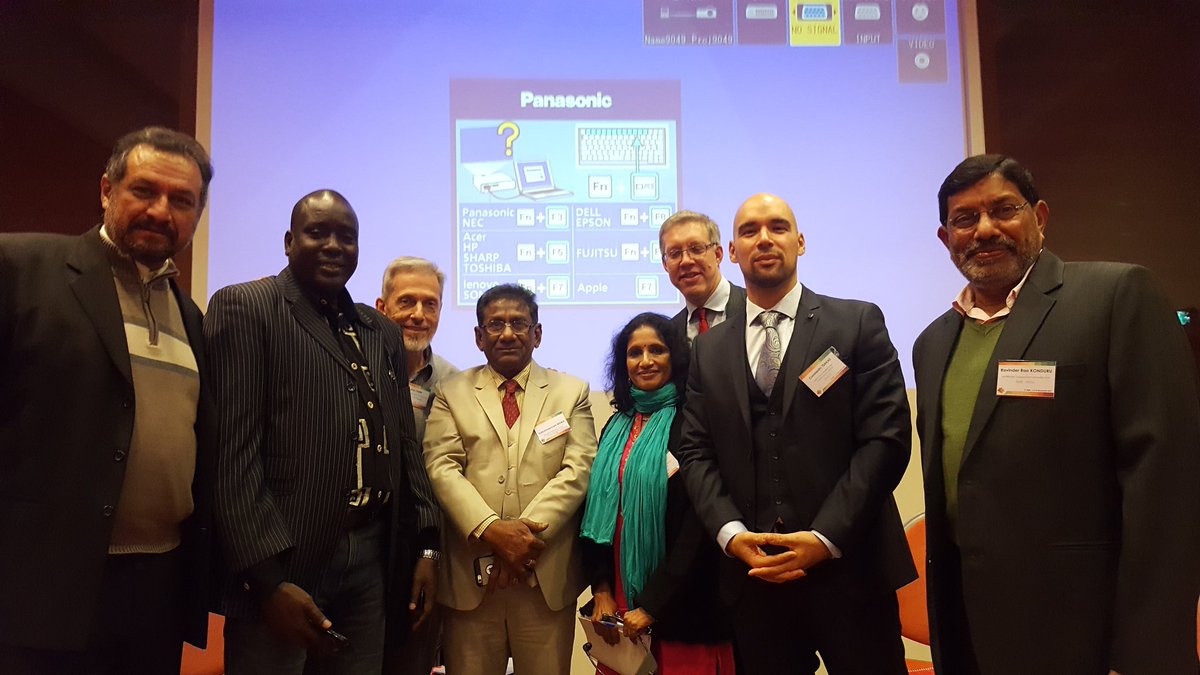
How can the Social and Solidarity Economy (SSE) contribute to supporting growth and employment in Mediterranean Partner Countries (MPs)? This is the question to which the presentation of Dr. Constantin Tsakas (General Manager of Institut de la Méditerranée, General Secretary of FEMISE) offered elements of response at the 8th Mont Blanc Meetings (RMB) (6-8 December 2017, Archamps, Greater Geneva), the International Summit of the Social and Solidarity Economy (ESS) organized by ESS International Forum (Permanent Co-Secretary of the International SSE Pilot Group, Observer Member ate the UN Inter-Agency Task Force on SSE).

Dr. Constantin Tsakas (Institut de la Méditerranée, FEMISE) (photo:RMB)
Dr. Tsakas presented the preliminary results of a chapter of the forthcoming FEMISE EuroMed 2018 report produced by Institut de la Méditerranée (IM) during a session on “Effective responses to sustainable impacts: social cohesion, solidarity and inclusion”.
Dr. Tsakas emphasized that SSE could become a tool for economic, financial and social innovation adapted to MPs. The latter are facing today many problems related to unemployment, lack of inclusiveness, the informal economy, limited growth… The SSE sets a frame of reference for rebuilding social ties around the economy, to better value resources and assets of territories and anchor development, to provide training and mobilize available skills in an entrepreneurial dynamic. The SSE allows for :
- The mobilization of numerous young people, which are looking for a job and are progressively oriented towards entrepreneurship.
- The establishment of a more inclusive economy because the SSE knows how to create jobs for vulnerable people that neither the State nor traditional companies can integrate.
- Economic diversification and upgrading.
As civil society has understood, since the Arab Spring there has been an effervescence and increased emergence of SSE structures. Real success stories help meet the needs of the people …
In Morocco, which counts 15700 cooperatives (including 2287 women’s cooperatives) and 120 000 associations (with more than 15 million members), the value chains of SSE entreprises are made up of private sector companies: production cooperatives in the agricultural sector, crafts and / or fishing market their production in the private sector (local, regional, small and large retail markets).
In Egypt, initiatives are led by the private sector and have emerged to address the growing inability of governments and traditionnal private sector activities to meet the diverse needs of poor households for certain services and products.
In Tunisia, the country has nearly 20000 associations with more than 12 million members, half of whom have been created in the past five years under the impulse of the post-revolution civil society. The agriculture and fisheries sector is one of the sectors with the most SSE entreprises.

Panelists at session on “Effective responses to sustainable impacts: social cohesion, solidarity and inclusion” (photo :IM).
However, in general, the state does not sufficiently support the SSE in the South Mediterranean and does not create the necessary conditions for its sustainability. Dr. Tsakas emphasized that at the heart of the SSE dynamic lies the issue of project funding and resource mobilization. Preliminary results indicate that the financing of SSE enterprises must be a priority of concern for local, national and also EuroMed authorities. A “SSE finance” allowing access to liquidity and credit in relation to shared coordinated objectives is necessary. It would be appropriate for each MP to support, most notably through the establishment of an enabling regulatory framework, the emergence of “social”, “participatory” or “ethical” banks to channel funds to useful, sustainable and inclusive projects. It would also be wise to encourage SSE financing by microfinance institutions that have a developed territorial network. It would also be possible to innovate by proposing types of Social Impact Bonds (SIB), very popular in the Anglo-Saxon world, which make it possible to finance social programs (fair trade, social tourism, access to culture etc.) by private investors. The 2018 EuroMed report will suggest tools that can be supported by all local, national and international actors and which allow addressing the identified funding obstacles.
In conclusion, Dr. Tsakas emphasized the need to develop a strategy for the emergence of SSE ecosystems and social entrepreneurship on 3 axes (Macro-Meso-Micro). Dr. Tsakas provided an overview of FEMISE’s vision for the emergence of such ecosystems:
- Support to the development of a policy and regulatory environment conducive to the growth of social enterprises through national strategies and advocacy panels.
- Raising awareness and building the capacity of meso actors in the ecosystem to support the growth of social enterprises. MED mapping of these support actors, the generalization of training activities and the exchange of good practices would contribute to this process.
- Finally, there is a need to better demonstrate and promote the economic potential of social enterprises in creating value and jobs in MPs. A true methodology that quantifies the social impact is needed here. The same is true for financial support for social entrepreneurship, for entrepreneurs training and for mentoring initiatives.
These and other issues will be developed in detail in the next FEMISE 2018 Report, which will focus on private sector development in the Mediterranean (Q1 2018).
The powerpoint presentation of Dr. Tsakas to the RMB is available by clicking here.
Prior to the publication of the FEMISE2018 EuroMed report coordinated by Pr. Patricia AUGIER (Pt of the Scientific Committee of IM and FEMISE, Coordinator of FEMISE), we also suggest some excerpts from interviews with three key actors of social entrepreneurship in the EU -MED.
Follow us on Twitter by clicking here.


